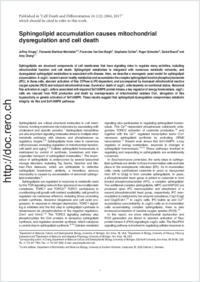Sphingolipid accumulation causes mitochondrial dysregulation and cell death
- Knupp, Jeffrey Department of Molecular Cellular and Developmental Biology, University of Michigan, Ann Arbor, MI, USA
- Martínez-Montañés, Fernando Department of Biology, University of Fribourg, Switzerland - Department of Biochemistry and Molecular Biology, University of Southern Denmark, Odense C, Denmark
- Van Den Bergh, Francoise Department of Molecular and Integrative Physiology, University of Michigan, Ann Arbor, MI, USA
- Cottier, Stephanie Department of Biology, University of Fribourg, Switzerland
- Schneiter, Roger Department of Biology, University of Fribourg, Switzerland
- Beard, Daniel Department of Molecular and Integrative Physiology, University of Michigan, Ann Arbor, MI, USA
- Chang, Amy Department of Molecular Cellular and Developmental Biology, University of Michigan, Ann Arbor, MI, USA
-
2017
Published in:
- Cell Death and Differentiation. - 2017, vol. 24, no. 12, p. 2044
English
Sphingolipids are structural components of cell membranes that have signaling roles to regulate many activities, including mitochondrial function and cell death. Sphingolipid metabolism is integrated with numerous metabolic networks, and dysregulated sphingolipid metabolism is associated with disease. Here, we describe a monogenic yeast model for sphingolipid accumulation. A csg2Δ mutant cannot readily metabolize and accumulates the complex sphingolipid inositol phosphorylceramide (IPC). In these cells, aberrant activation of Ras GTPase is IPC-dependent, and accompanied by increased mitochondrial reactive oxygen species (ROS) and reduced mitochondrial mass. Survival or death of csg2Δ cells depends on nutritional status. Abnormal Ras activation in csg2Δ cells is associated with impaired Snf1/AMPK protein kinase, a key regulator of energy homeostasis. csg2Δ cells are rescued from ROS production and death by overexpression of mitochondrial catalase Cta1, abrogation of Ras hyperactivity or genetic activation of Snf1/AMPK. These results suggest that sphingolipid dysregulation compromises metabolic integrity via Ras and Snf1/AMPK pathways.
- Faculty
- Faculté des sciences et de médecine
- Department
- Département de Biologie
- Language
-
- English
- Classification
- Biological sciences
- License
-
License undefined
- Identifiers
-
- RERO DOC 306210
- DOI 10.1038/cdd.2017.128
- Persistent URL
- https://folia.unifr.ch/unifr/documents/306452
Other files
Statistics
Document views: 85
File downloads:
- pdf: 181
- Supplementary material: 153

